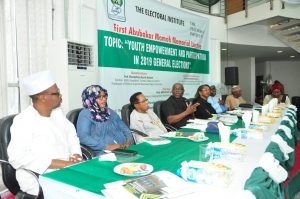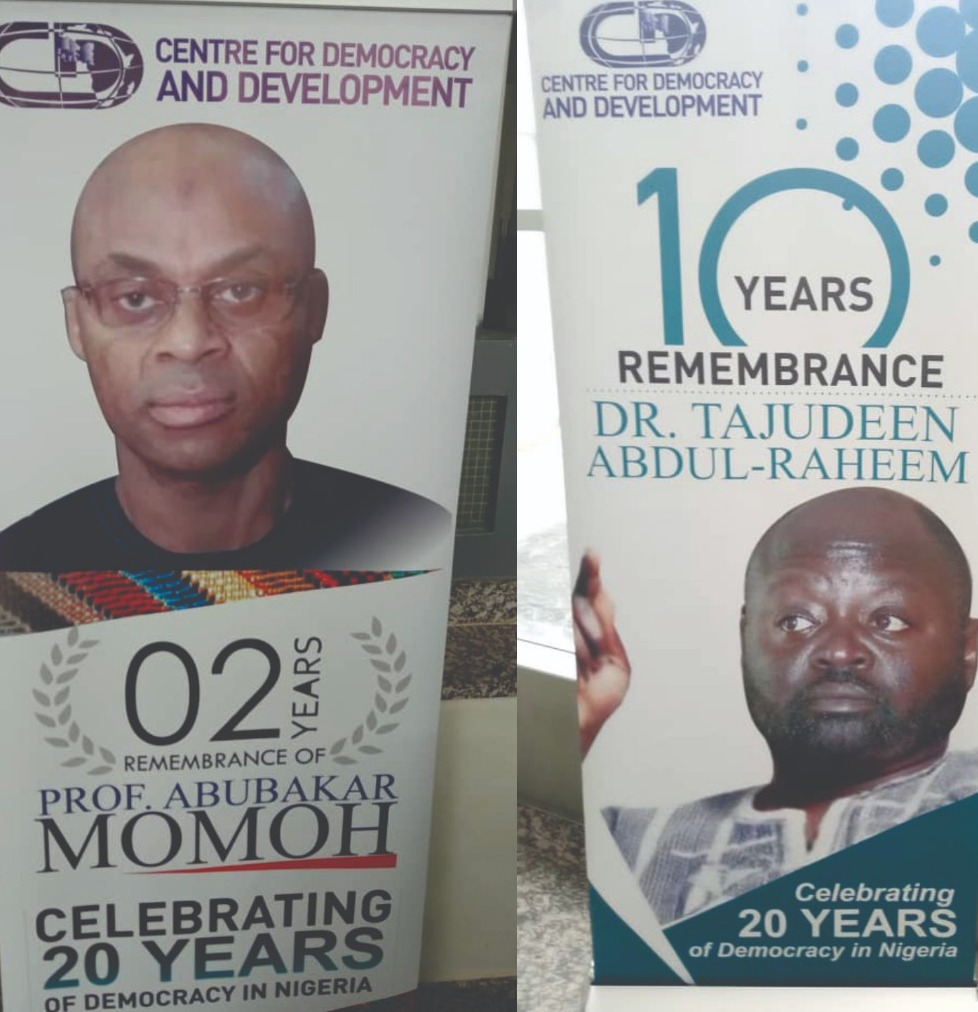Very symbolic individuals in that circuit were already on the ground before it was 9 O’clock on June 11th, 2019 when the two of them were remembered for the umpteenth time. The two in question are Professor Abubakar Momoh and Dr. Tajudeen Abdulraheem, activist intellectuals of the African democratic revolution but who all died in their prime: Momoh on May 29th, 2017 and Taju on May 25th, 2009 in far away Kenya from where his body was flown back to Nigeria and buried in Funtua although, originally, he is from Ogbomosho in Oyo State.

Attendees at the 2018 joint commemoration of Abubakar Momoh, Winnie Mandela and Tajudeen Abdul-Raheem in Abuja
Taju by which he was known all over the world was, however, not as known in Nigeria as he was in other parts of Africa, particularly East Africa where his activism located him for a much longer time after his doctoral pursuit in Oxford. Abubakar Momoh was more known because his teaching job at the Lagos State University, (LASU) and activism in ASUU brought him directly in contact with students and, by implication, the larger Nigerian society. Momoh was no less a global scholar, having expanded his academic space as a resource person across Europe and North America.
The two were very similar in many regards. While Momoh wrote his thesis on the philosophical imagination of Pan-Africanism, Taju was the ultimate hands-on man on practical Pan-Africanism. with the Secretariat of the resurgent Pan-African Congress becoming his operational jump-off point for many years in Uganda. While Momoh was a study in the calm and the turbulent all at once, Taju was the study in the weaponisation of laughter. Prof Okello Oculi, an older Pan-Africanist, once compared his laughter to an armored tank or something like that. While Momoh took the mandate of knowledge very seriously, Taju invented and took the mandate of Pan-Africanism very seriously. That is the idea that Africa can unmake its fault lines – cultural, territorial and political.
The comparison applies equally to how both men died: Taju by accident and Momoh without sickness. The day he dies, he had actually driven himself around in Abuja. So similar in many ways that the yearly remembrance of them is now done as one event., each one attracting many ‘junior’ and ‘senior’ members of the circuit, some arriving very early as in January 11th, 2019.
For 2019, the list is cross-crossing. The programme showed Prof Adebayo Olukoshi, an ex- this, ex- that of Pan-African scholarship; Prof Adiele Junidu, an elderly political scientist and probably Momoh’s teacher at the University of Lagos, (UNILAG) in the 1980s; Prof Okey Ibeanu and Prof Mohammed Kuna, INEC colleagues of Momoh; Jibrin Ibrahim, another political scientist; Prof Julius Ihonbvere, yet another political scientist; activist Hafsat Abiola; ace columnist Mahmud Jega and Dr. Kayode Fayemi, governor of Ekiti State of Nigeria.In other words, the media, researchers, international NGOs and colleagues, amongst others, could be counted.
 That is the closest to the element of a paradox about the duo: very clear and committed to a singular cause but celebrated by bearers of different tendential homesteads in the struggle for emancipation.
That is the closest to the element of a paradox about the duo: very clear and committed to a singular cause but celebrated by bearers of different tendential homesteads in the struggle for emancipation.
No less are the themes each of them brought within the radius of radical scrutiny. A good example is Taju’s focus on rural banditry, many many years ago, a problem confronting Nigeria today. Organisers of his anniversary made it the topic of the memorial in 2017. In 2019, they were the points of reference in the theme “Celebrating ’20 Years of Democracy in Nigeria” in which Ekiti State governor, Dr Fayemi was reading a citation “Remembering Late Dr Tajudeen Abdul-Raheem and Prof Abubakar Momoh”; Daily Trust columnist, Mahmud Jega delivering a Keynote Address titled “A Reflection on the 20 Years of Democracy in Nigeria”; Adebayo Olukoshi of International IDEA moderating a panel session featuring Gov. Fayemi, Hafsat Abiola and Jibrin Ibrahim and a second panel session on “Mapping a Way Forward: Future of Democracy in Nigeria” in which Ayisha Osori of OSIWA and Onyinye Ough of Set Up Nigeria were featuring as discussants with Prof Ihonbvere as moderator.
It was the also late Rufai Ibrahim who wrote in a book of tributes to Dr. Bala Mohammed, assassinated Political Adviser to late Abubakar Rimi that people who evoke strong visions of society have a tendency to die young. He presents a puzzle: do people who have strong visions of society stop posing them so as to probably escape dying young?
There was a time something of this nature came up for discussion. A Bayero University, Kano activist who is still alive and kicking rubbished it all by asking if strong visioning and the associated pursuit of it is the most dangerous threat. You may be fighting for nothing but could still be killed by NEPA cables from nowhere or choke on something or even die of malaria.
May Momoh and Taju’s spirit continue the conversation over there with all their fellow travelers who went ahead or after!




























